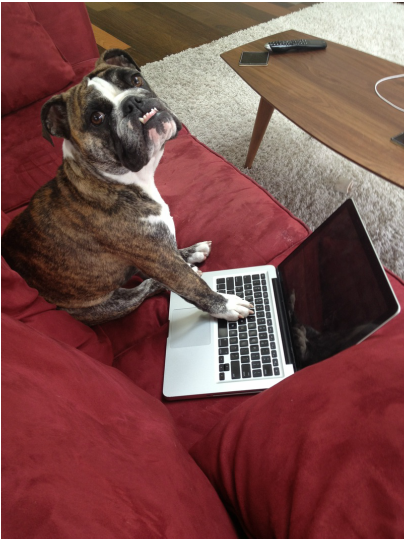|
Guest post by Brooke (Lucy's mama).
I believe that people are generally good. There are plenty of bad people out there. Turning on the news these days is an assault of murders, rapes, theft, and other examples of people doing some pretty awful things. But in the classic debate of “are people naturally good or naturally evil,” I believe pretty strongly that people are indeed good. Which is exactly why I think that we, myself included, need to cut everyone else around us some slack in our day-to-day interactions. I’m not sure when or why we all got so critical and judgmental of one another, but it isn’t good for any of us. Recently, my fiancé and I came to the same realization, independently of each other: we need to be more understanding of "bad" drivers we share the road with. Ever since I started driving my bulldog Lucy around the city, and consequently started driving like a cautious old lady lest I jolt my car too quickly and she goes flying around the car, I realized that there are any number of reasons for people to drive like, well, morons. San Francisco driving is usually a series of quick turns, yellow light running, speeding, and whipping around slower cars just in order to get wherever you’re trying to go as efficiently as possible, and we don’t take lightly other drivers that don’t also follow these city driving norms and who slow us down for even a second. The other day I saw a driver slowly and thoughtlessly drift into my lane and I smugly thought “tourist” before catching his Nevada license plate. But how many times have I done the same thing because I’m trying to not jolt Lucy? Or times that I drove slowly and poorly because I was driving a car I was unfamiliar with? Many times recently I’ve realized that I was being exactly the same kind of driver I usually can’t stand, and as people drive past and glared at me, I’ve thought “You don’t understand! Normally I’m like YOU – but today something is different and I don’t deserve your hatred!” I think they call these the “a-ha moments” in our lives. I just need to remember to cut these people some slack—who knows why they’re driving the way they are? And does it really matter that much? Here’s another example: as a female, how many times have I glanced over at a girl at a party or at a bar and immediately judged them or wrote them off as one stereotype or another, only to find myself wanting to become her new best friend later after 5 minutes of conversation? Why do we do this? I dislike very few people once I get to know them, so why do I assume when I see someone I don’t know that I won’t like them? That kind of quick judgment isn’t helpful or healthy for anyone. There are plenty more examples of this. The clerk at the DMV that treats you poorly and you in return give her attitude, and walk away thinking “what’s HER problem?” The ticket maid (err… parking enforcement officer) that won’t let you off even though you got there BEFORE he started writing the ticket! The person from the opposing political party that Just. Doesn’t. Get it. Why do we judge these people or let them get us down, when we don’t really stop to understand why they’re acting the way they are or why they believe the way they do? Presumably, the clerk isn’t pleasant because she works at a thankless, stressful job where she probably gets attitude (or worse) by people like me all the time. And who wants to be a parking enforcement officer? Literally no one is ever happy to see you. (Fun fact: I once saw a guy giving me a parking ticket from my bedroom window and I ran downstairs and begged him not to ticket me, and he didn’t! He said it was because I didn’t yell and curse at him like everyone else does. Kindness really can be a useful tool, kids.) And while I myself have a very difficult time understanding those with political views different from my own – particularly in social issues – I know deep down that their belief system comes from a good place, as misguided as I may find it. So let’s cut these people some slack, shall we? We shouldn’t assume based on quick interactions and first glances that someone is “bad” in one way or another. People are good, but we all have bad moments or moments of weakness. It’s important that we all put our best foot forward as often as we can, and that includes reminding ourselves that no one is perfect. Not only will people respect you more if you approach situations with an open mind and without judgment, but your mental and emotional health will be better off for it. Wouldn’t you like it if people cut you a little slack now and again? - Brooke
3 Comments
I think you just rediscovered the 'fundamental attribution error' (a common cognitive bias) ;-) The short version is that in others we explain by enduring traits what would be better explained by circumstance and context.
Reply
Brooke
5/14/2012 06:33:17 am
Fascinating, Shaneal! I certainly did not consider this from a scientific or psychological perspective, but this is spot on.
Reply
Kim
5/14/2012 07:16:33 am
Shaneal strikes again with infallible peer-reviewed logic. Brooke, I realized this recently when I was driving in Arizona with California plates and pulled an agressive lane change. I thought, "oh no the people I just cut off will think I'm an idiot tourist", when in fact, I am just a bad driver. In that case, the 'fundamental attribution error' probably worked in my favor. Leave a Reply. |
Archives
May 2024
|
